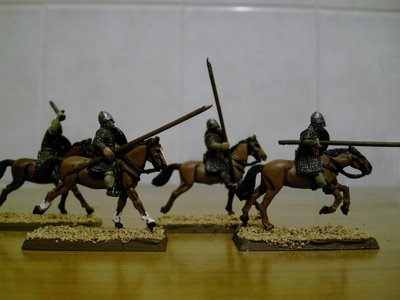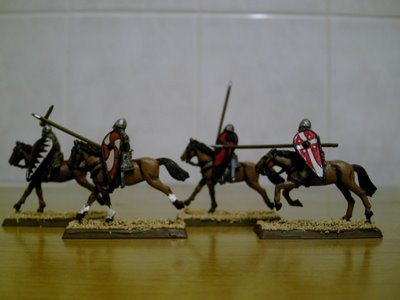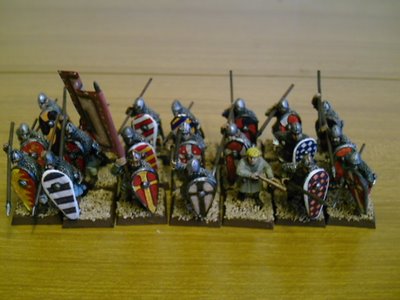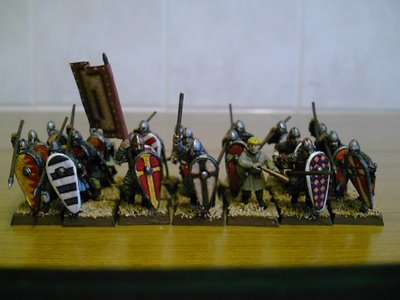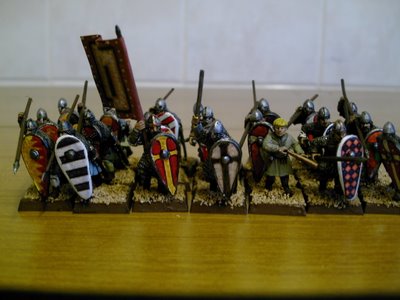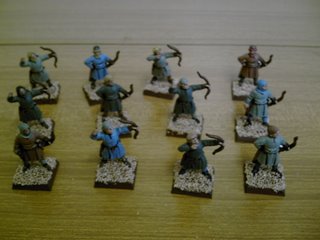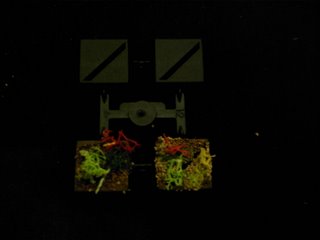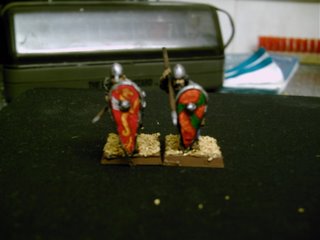The Tabletop: The table top was mostly flat level ground. I arrived last so Colin had already set up the board with "symmetrical" terrain to ensure the ground did not provide an advantage to either side. In my left quarter there was a hill, level ground in the centre and woods on my right. In the centre of the table was a field of crops which allowed half movement and did not block line of sight (No, 15 feet of corn will not stop an arrow!). On my left Colin had a wood on his side of the table and a hill on my right.
A Brief Word ABout Photo's:
There are a lot of very bad, poor quality photo's scattered around this battle report. Believe it or not, these are the ones that turned out best. For some reason the flash on my digital camera had packed in and as we've already seen my cameras autofocus isnt exactly top class. So I can only apologise for the very poor quality of these pictures. Colin had a very well painted army, but it doesn't show through well in these pics. Any naked figures you see are my own: I`m ashamed to admit it, as I HATE playing with naked miniatures (I`m a bit of a paint Nazi, it's true).
Oh yeah, about the "naked"balsa wood movement trays. Yes, I know, they are very garish. But I only finished painting and flocking the movement trays last night. As I had to blue tack the figs to the base for transport I fixed them to the underside of the base. I didnt want the flock coming off before I'd had time to give it a PVA wash over the top. The idea was to arrive early and then place the minaitures on the trays the "right" way up. But due to running late at work (fixing other peoples mistakes, as usual) there wasn't time to sort things out before the beginning of play.
The Armies:
Vikings
I didn't think to ask Colin for a copy of his list, so this is not an exact breakdown. But from my left to his right:
1 unit of 13 skirmishing Hirdmen (Hirdmen) with Double Handed Axes and Throwing Spears (began in the woods on Colin's side of the table.
A fairly large unit of Bondir (Bondir 1) with throwing spears and handweapons. Maybe twenty-four strong.
This unit deployed directly opposite the hill on my left. 4 ranks.
A second, larger unit of Bondir (Bondir 2) with throwing spears and two-handed axes, accompanied by a Godir. Directly opposite the crop field. 4 ranks
A unit of around 24 Hirdmen (Bodyguard) led by the Army General. Double handed axes and throwing spears. Includes 3 Berserkers. Facing crop field. 4 ranks
A unit of about ten skirmishing archers (Archer 1) deployed in front of Bondir 1 and the Hirdsmen, screening them both.
A final unit of ten skirmishing archers (Archer 2)deployed on the hill to my fight.
Normans:
Again from my left to my right.
21 Dismounted Milites, (Milite Foot) thrusting spears, heavy armour, shield.
Deployed on the rear slope of the hill on my left. 3 ranks.
12 Coloni Skirmishers (Coloni) with bow. Skirmishers. Deployed on the hill crest.
16 Serjents (Serjents) with lightarmour, shield and double handed weapons. Deployed opposite Bondir 2 and facing the crops. Light Infantry. 3 ranks.
21 Liberi (Liberi) with shield and spear. Deployed to the right of the Serjents. Facing Crop Field. 3 ranks.
11 Mounted Milites plus Dux (Knights) deployed slightly behind and between the Serjents and the Liberi. 2 ranks.
The forest on my right remained empty (apart from dice and "dead" miniatures) for the duration of the game.
I set up second and finished first. Colin won the first round (which suited me fine).
THE BATTLE
Turns 1 and 2:
On turns 1 and 2, the Viking Line advanced along its length, with the Hirdmen on my left moving forward to flank my forces on the hilltop. My Serjents, Liberi and Knights marched to meet the Vikings while the Milite Foot on the hill stood their ground. My shooting was largely ineffective, but it did suffice to reduce the numbers of Bondi unit 1. The Viking shooting was far more formidable. The Liberi were quickly reduced to a single rank and some change by the end of turn 2. However, they were know firmly in place and ready to charge the Viking Archer unit screening his battle line (Archer 1). I knew that once they drove off these pesky skirmishers, the Berserks would unleash their fury against these sacrificial lambs. Whether it was the bravery of their hearts or the thought of being run down by their own Knights should they turn and run, they passed every panic test (one per turn) and advanced steadily into position. The Godir chose this moment to leave Bondir unit 2 and join the Bodyguard in anticipation of a charge by the oncoming cavalry.
By this point, the First unit of Bondir were also at the base of the hill on my left.
Norman Turn 3.
The Viking Bondir at the foot of the hill chanted and jeered as they tried to entice the Milite Foot down from the hill, the crest of which they had advanced to at the beginning of the battle. However, the poor-sighted Bondir leader (no doubt squinting as the sun reflected off the shiny helmets of his foes) was unable to discern that the Milite Foot were in heavy armour, and could not have charged them even had they been foolish enough to give up the hill.
Meanwhile, on the right the Liberi let out a mighty yell and charged the Viking Archer unit screening the Bodyguard. Though a few more of these brave and doughty warrior (with the encouragement of their Duke and their own unit leader) fell as the cowardly Bondir fired and ran, their failed charge did bring them close enough to the Bodyguard that they could see the rolling eyes and frothing mouths of the three berserks struggling to break free from their comrades and wreck bloody havoc upon the field.
Meanwhile, the Knights cheered the brave sacrifice of their peasant levy, advancing behind them in anticipation of the gap they would open in the line. This would be a path leading straight to the Viking General, his bodyguard and a moment of Norman glory.
To the Liberi's left, the Serjents advanced into the cornfield. Their shouted challanges and crude gestures made clear their intentions to engage the second and largest unit of Bondir at the earliest opportunity. This was a clash the fierce vikings seemed to anticipate with relish. Meanwhile, the Coloni screening the Milites atop the hill moved round to screen the left flank of theMilite Foot from the encroaching Hirdmen skirmishers.
Viking Turn 4
The Viking General and his Hirdmen could restrain their frothing maniacs no longer. Two of the three berserkers burst from the unit, storming into the sorrowful remnents of the Liberi and ripping them to pieces, accompanied by gales of laughter from the Bodyguard. A third berserker, seeing an whole regiment of Norman Serjents before him, could not resist the thought of attacking so large a unit single-handedly and was quickly cut down for his trouble, having claimed only a single mercenary to wait upon his table in Valhalla.
The small unit of Bondir on the Norman left maintained their position beneath the hill, waiting for their Hirdmen skirmishers to move into position and steeling themselves for a bloody slaughter. The Hirdmen themselves moved to engage the Coloni at a run but could not reach them this turn, eager to avenge the single shield-brother who had so far fallen to Norman archery.
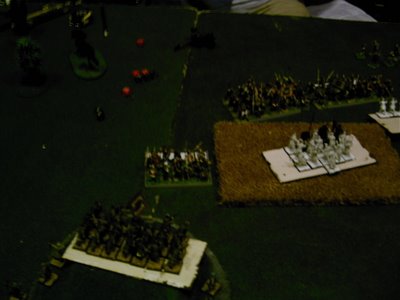
Above: " I taunt you a second time!".
Meanwhile, the Viking Bodyguard inched backwards in horror of the coming charge, but despite their best efforts at "finding surer ground" they knew they could not hope to put sufficient distance between themselves and the Norman horseflesh bearing down upon them
The viking archers upon the hill and those who had fled from the Liberi assault now turned their bows upon the now screenless Norman Knights. Three knights and their mounts died screaming under Viking Arrows, and the brave knights gritted their teeth and the loss of so much noble blood in so unseemly a fashion. Yet their Dux's strong will and calls for order kept the maddened knights from wasting their charge upon such unmanly foes. The knights, couching their lances, grinned evilly as they summoned up thoughts of revenge, anticipating the slaughter their powerful lances would wreck amongst the Viking Hirdmen of the Bodyguard.
Norman Turn 4.
The proud company of Norman knights let fly their brave battle-cry and charged across the hoof churned, blood-soaked earth. They barely paused to swat the now exhausted and near dead bersekers out of their path. With a great and mighty crash, the Norman Knights wreaked a mighty havoc in the Viking ranks, three hirdmen of the Bodyguard fell beneath the lances of Milites and Dux and another two fell beneath the mighty blows of iron-shod hooves. Yet the Danish axes, swung with all the desperate might of hardened men, took blood of their own, the Viking General himself claiming three more brave knights. For a moment it seemed the Viking line would break, but then, just as the Norman musicians throat was dried from fear and dust, the Viking hornblower let air a mighty note. With fresh vigour, the Danish forces pushed into the Shieldwall. Hacking left and right, Dux Baldwin looked first to the screaming horses and dying men around him, then to the Vikings with their deadly axes before him, and he knew their line would not break. Deciding that to stay and fight against such numbers with the momentum of the charge all but lost was far less attractive than the thought of Viking arrows he led his brave retinue out of the fight in good order. There, sufficiently distant that no Viking charge could reach them, he set about re-organising his much reduced line and made ready for another charge.
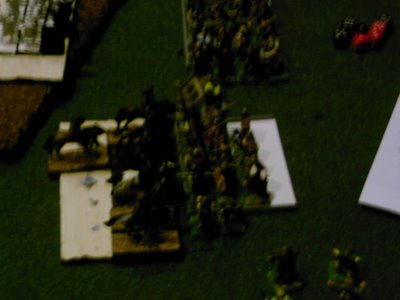 Above: The surviving knights as they begin to fall back in good order.
Above: The surviving knights as they begin to fall back in good order.The brave and doughty Serjents, seeing that their general was leading the flower of their army away from the melee, recognised that their intent was to reform and charge again. They did not panic, but steeled themselves for the coming onslaught. A few moments later they had advanced to the edge of the wheatfield.
Viking Turn 5/Norman turn 5
All across the battlefield the two armies jockeyed for position. On the left, the Hirdsmen finally manouvred themselves into a favourable position where they could charge next turn. The Bondir at the foot of the hill finally seemed to notice how heavily armoured the Milite Foot were when the Normans began to advance down the forward slopes. They continued taunting the Vikings trying to entice a reckless charge. Thus allowing the Norman Coloni better shots at the Hirdmen. Even so, the feudal serfs were so terrified by the sights and sounds around them that they only felled a single Hirdmen between them.
On the Norman centre: disaster. The retreat of the Knights became a rout. Though the Dux struggled mightily to reassemble his line in some sort of order, the hail of viking arrows and the death of two more knights started a panic he was powerless to prevent. Cursing his men for women and worse, he was left to ride after them waving his sword in the air, shouting "Rally, Rally!" to no avail.
Viking Turn 6
All across the battlefield, the Viking horde gave voice to a mighty cheer. The Hirdsmen on the Norman left charged the Coloni, who paused to fire a single arrow each before fleeing. However, so shaken were they by Viking might that not a single arrow struck home with sufficient force to piece mail. The brave Hirdsmen, thwarted by this cowardly retreat, instead charged home into the flanks of the Milite Foot on the hill ( I forgot about the redirecting charges rule). Seeing this, the more timid Bondir at the foot of the hill also finally charged forward to join the fight. Two brave Norman spearmen were quickly cut down from behind and a third from the fore, but the doughty spearmen, knowing that though their flanks were threatened, the high ground was theirs, stubbornly refused to flee. They fought on, slaying two of the Hirdsmen and two Bondir. Even without their rank bonus, this made the combat a draw. Though once again Viking Horns sounded louder than Norman trumpets, the Dismounted milites stood firm and unshaken. They fought on.
Meanwhile, across the cornfield the situation seemed just as bleak. The charge of the second Bondir unit was preceded by a veritable shower of throwing spears. Yet the doughty Serjents, seasoned by generations of similar campaigns, simply cowered behind their great kite shields and took the weapons of their enemies upon them without complaint or the loss of a single man. Only when the vikings closed with axes did the first Serjent fall. But then, the Normans struck back with powerful Danish axes of their own, and while only a single Bondir fell, the brave song of the Norman trumpet and the sheer nonchalance with which the Serjents accepted the Viking charge took the fight out of their enemy. Suddenly remembering urgent business elsewhere, the largest Viking unit on the field took to their heels and fled. However, not one would live to attend to that business. As they fled, the Norman mercenaries pursued pitilessly, so that in a few sheer, brutal moments, theViking line was penetrated. Their largest "warband" had been massacred in flight. The Viking line was split and the Norman axemen were behind their Lines.
Meanwhile, across the cornfield the situation seemed just as bleak. The charge of the second Bondir unit was preceded by a veritable shower of throwing spears. Yet the doughty Serjents, seasoned by generations of similar campaigns, simply cowered behind their great kite shields and took the weapons of their enemies upon them without complaint or the loss of a single man. Only when the vikings closed with axes did the first Serjent fall. But then, the Normans struck back with powerful Danish axes of their own, and while only a single Bondir fell, the brave song of the Norman trumpet and the sheer nonchalance with which the Serjents accepted the Viking charge took the fight out of their enemy. Suddenly remembering urgent business elsewhere, the largest Viking unit on the field took to their heels and fled. However, not one would live to attend to that business. As they fled, the Norman mercenaries pursued pitilessly, so that in a few sheer, brutal moments, theViking line was penetrated. Their largest "warband" had been massacred in flight. The Viking line was split and the Norman axemen were behind their Lines.
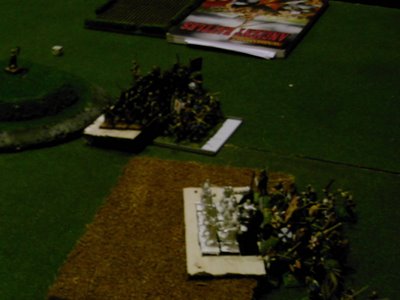 Above: The crucial moment before...... and (below) after the Viking Line Breaks. The batle on the hill (the miniatures have been moved slightly forward off the hill to stop them falling over) can be seen in the background. Well, sort of "seen" anyway. The unit in the foreground below is the Viking Bodyguard.
Above: The crucial moment before...... and (below) after the Viking Line Breaks. The batle on the hill (the miniatures have been moved slightly forward off the hill to stop them falling over) can be seen in the background. Well, sort of "seen" anyway. The unit in the foreground below is the Viking Bodyguard.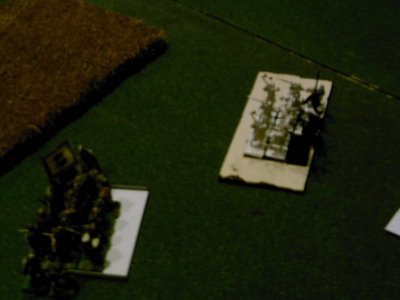
Where once, just a moment ago, it had seemed that all was lost for the brave defenders of Caen, now victory seemed once again within their grasp.
Norman Turn 6:
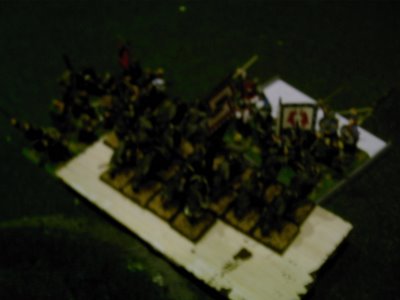 Above: The Battle on the Hill Top.
Above: The Battle on the Hill Top."Look you fools. Stop! They flee! They flee!"The Norman Dux was finally able to raise the spirits of his few surviving knights and squires. They once again turned their faces towards the battle. Seeing that their dismounted brothers and kin were near-surrounded atop the hill, the Knights spurred their horses to their relief them. But night was falling and the Dux already knew the battle would be over before he could reach his men. He cursed the wasted opportunity to acheive victory. With just another hour of daylight he could crush the Viking Bodyguard between proud horseflesh and Norman Serjents. Instead all he could do was spur his horse towards his embattled spearmen. Preying without much hope that the sight of his rapidly approaching horsemen would steal their hearts and convince them to fight on until full dark enveloped the battlefield, he urged his horse ever onward with lash and spur.
Atop the hill two more brave milites fell to Viking axes, by now the Norman line was breaking as men and burly Hirdsmen pushed their way into the gaps. For a long, dreadful moment the standard wavered, it feel to the ground from the hands of the brave Milite who carried it only to be taken up in the hands of another. As the line began to break, this brave young squire, Baldwin II, nephew od the Dux, peered to the left over the heads of his defeated countrymen and cried out:
"The Dux, the DUX! The DUX has come!"
With that, the brave warriors put their backs into the fray, not wanting to be shamed before their lord. On till darkness they fought, and when the surviving warriors of both sides left the field, none could say for sooth whether their battle had been one or lost. It seemed then, that the only reward for their valour would be another battle on the morrow....
Summary:
This was a very tight, close game, which could have gone either way. At one point, when 600pts worth of my army were riding away into the sunset, Colin suggested that now would be a good time to concede. But like a true tenacious Scot, I said "nah!" and fought on. And just as well. For in the very next turn, when all seemed lost and Colin was rolling a terrifingly large number of dice, his Bondi broke and ran. After taking just one casualty and then failing the roll off (Although my banks ranks were still in difficult ground, their light infantry status meant that I kept the +2 rank bonus)! Just like that, Colin had lost his largest unit and a strong infantry unit was behind his lines with only skirmishing archers and a much reduced Bodyguard to face them. It wasn't until after the game that Colin realised he should have moved his Godi back into the Bondi unit after my knights were chased off.
As it was, I hadn't even realised that he'd moved the Godi into the Bodyguard in the first place If I had, I wouldn't have been so eager to charge them with my knights. Not without inflicting a few missile casualties first! Ferocious charge would have done nothing to break them and with no rank bonus left and only str3 vs toughness 5 after the first round of combat, there was no way they would win a protracted fight. But such is life. Its a shame though, when those dice came up six and five for the break test, even the presence of the general nearby couldn't stop those Bondi fleeing. And THEN the Serjents pursued 11" into Colins side of the board to contest an otherwise secure table quarter. Its funny how one roll of the dice can change everything.
Atop the hill two more brave milites fell to Viking axes, by now the Norman line was breaking as men and burly Hirdsmen pushed their way into the gaps. For a long, dreadful moment the standard wavered, it feel to the ground from the hands of the brave Milite who carried it only to be taken up in the hands of another. As the line began to break, this brave young squire, Baldwin II, nephew od the Dux, peered to the left over the heads of his defeated countrymen and cried out:
"The Dux, the DUX! The DUX has come!"
With that, the brave warriors put their backs into the fray, not wanting to be shamed before their lord. On till darkness they fought, and when the surviving warriors of both sides left the field, none could say for sooth whether their battle had been one or lost. It seemed then, that the only reward for their valour would be another battle on the morrow....
Summary:
This was a very tight, close game, which could have gone either way. At one point, when 600pts worth of my army were riding away into the sunset, Colin suggested that now would be a good time to concede. But like a true tenacious Scot, I said "nah!" and fought on. And just as well. For in the very next turn, when all seemed lost and Colin was rolling a terrifingly large number of dice, his Bondi broke and ran. After taking just one casualty and then failing the roll off (Although my banks ranks were still in difficult ground, their light infantry status meant that I kept the +2 rank bonus)! Just like that, Colin had lost his largest unit and a strong infantry unit was behind his lines with only skirmishing archers and a much reduced Bodyguard to face them. It wasn't until after the game that Colin realised he should have moved his Godi back into the Bondi unit after my knights were chased off.
As it was, I hadn't even realised that he'd moved the Godi into the Bodyguard in the first place If I had, I wouldn't have been so eager to charge them with my knights. Not without inflicting a few missile casualties first! Ferocious charge would have done nothing to break them and with no rank bonus left and only str3 vs toughness 5 after the first round of combat, there was no way they would win a protracted fight. But such is life. Its a shame though, when those dice came up six and five for the break test, even the presence of the general nearby couldn't stop those Bondi fleeing. And THEN the Serjents pursued 11" into Colins side of the board to contest an otherwise secure table quarter. Its funny how one roll of the dice can change everything.
Speaking of which (and jumping around a bit here) I would say it's probably best not to go charging formed units of troops, even with my powerful cavalry, without softening them up first or going for the flanks. But Colin just had far too may skirmishers for me to be able to do that. At least not without clearing them out first.
One of the many things I did learn from this inconclusive battle (the points total to each side was damn near even, with one quarter and one banner each and nearly the same points value removed from the table) is that skirmishers really ARE far more useful in WAB than in WFB. I already knew this from conversations with other players (as well as games of Rome: Total War) but seeing is believing. I knew I was going into this battle short of skirmishers and it hurt me when I couldn't counter Colins very good quality skirmish line with my own( I was outnumbered 3 to one in skirmishers). In fact, those skirmishing archers of his very nearly cost me the game. First by taking away the knights Charge Bonus (they would have won the first round of combat otherwise) and then routing them a turn later.
In retrospect, perhaps I should have chased them off with my cavalry. However, using the knights in this way would have taken my generals high leadership away from the main battle line for at least a turn. All for the sake of a few hundred points of archers. If I'd done that they might never have gotten into the main battle at all, and that would be a considerable waste of nearly half my armies total points value.
I also learned a big Viking weakness: throwing spears are great in that first round of combat, (witness the effect on my Knights) but in a long drawn out fight, the guy with the thrusting spears will proabably win. Especially when you factor in that most Norsemen fight as Light Infantry. If it hadn't been for the Hirdsmen charging their flank and some bad dice rolling on my part, the Foot Milites would have wiped the floor with those Bondir in turn 6 and possibly even in turn 5.
Colin was also kind enough to break his usual habit and take some berserkers to show me how they work. He was right of course, they were too easy to counteract by sacrificing a few, cheap troops, even with Colins clear superiority in skirmishers. That's another one of my bugbears laid to rest.
Colin was a great sportsman throughout and really let down by his dice. He completely outmanouvred me, despite having an entirely infantry based forced. Turn 5 should really have been the nail in the coffin for me. It was Colins bad luck that kept me in the game, although I call it revenge for the poor marksmanship of my Coloni, who killed just three miniatures in six turns of shooting!!!. I also had my own share of bad luck, especially with saving throws. And in rolling a ten for my generals break test. Luckily though, the Knights were by this point too far away to risk breaking my Serjents as well.
He was very patient with my mistakes and even let me move my Serjents back a few inches when he explained that the distance a berserker charges is not affected by terrain penalties as I had assumed. Most significantly though, he pointed out the presence of my general within 12" of the Milites and happily admitted that I had passed my break test as a result. Thus, in speaking up he ensured he had held me to an honorable draw at the price of a less honorable victory. In the end, another turn would probably have won the Colin the battle. My Serjents were not in a position to charge the bodyguard, the Knights would have needed to spend a turn manouveing before they could charge into the fray and the stand on the hill could have collapsed at any moment. Colin might not agree, but if we played another turn he'd have won.
One of the many things I did learn from this inconclusive battle (the points total to each side was damn near even, with one quarter and one banner each and nearly the same points value removed from the table) is that skirmishers really ARE far more useful in WAB than in WFB. I already knew this from conversations with other players (as well as games of Rome: Total War) but seeing is believing. I knew I was going into this battle short of skirmishers and it hurt me when I couldn't counter Colins very good quality skirmish line with my own( I was outnumbered 3 to one in skirmishers). In fact, those skirmishing archers of his very nearly cost me the game. First by taking away the knights Charge Bonus (they would have won the first round of combat otherwise) and then routing them a turn later.
In retrospect, perhaps I should have chased them off with my cavalry. However, using the knights in this way would have taken my generals high leadership away from the main battle line for at least a turn. All for the sake of a few hundred points of archers. If I'd done that they might never have gotten into the main battle at all, and that would be a considerable waste of nearly half my armies total points value.
I also learned a big Viking weakness: throwing spears are great in that first round of combat, (witness the effect on my Knights) but in a long drawn out fight, the guy with the thrusting spears will proabably win. Especially when you factor in that most Norsemen fight as Light Infantry. If it hadn't been for the Hirdsmen charging their flank and some bad dice rolling on my part, the Foot Milites would have wiped the floor with those Bondir in turn 6 and possibly even in turn 5.
Colin was also kind enough to break his usual habit and take some berserkers to show me how they work. He was right of course, they were too easy to counteract by sacrificing a few, cheap troops, even with Colins clear superiority in skirmishers. That's another one of my bugbears laid to rest.
Colin was a great sportsman throughout and really let down by his dice. He completely outmanouvred me, despite having an entirely infantry based forced. Turn 5 should really have been the nail in the coffin for me. It was Colins bad luck that kept me in the game, although I call it revenge for the poor marksmanship of my Coloni, who killed just three miniatures in six turns of shooting!!!. I also had my own share of bad luck, especially with saving throws. And in rolling a ten for my generals break test. Luckily though, the Knights were by this point too far away to risk breaking my Serjents as well.
He was very patient with my mistakes and even let me move my Serjents back a few inches when he explained that the distance a berserker charges is not affected by terrain penalties as I had assumed. Most significantly though, he pointed out the presence of my general within 12" of the Milites and happily admitted that I had passed my break test as a result. Thus, in speaking up he ensured he had held me to an honorable draw at the price of a less honorable victory. In the end, another turn would probably have won the Colin the battle. My Serjents were not in a position to charge the bodyguard, the Knights would have needed to spend a turn manouveing before they could charge into the fray and the stand on the hill could have collapsed at any moment. Colin might not agree, but if we played another turn he'd have won.
Thanks Colin, for a great game, full of excitement till the end. I hope to play you again soon: but this time you'll be facing his holiness Baldwin II, (the Dux's nephew) and the holy armies of the diocese of Caen!
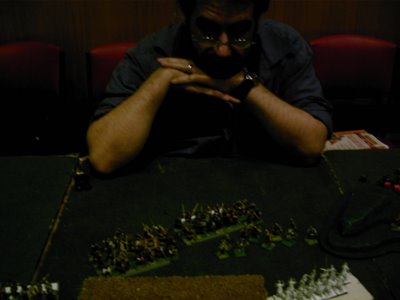
Above: Colin ponders his next move as the Liberi move into charge range.

